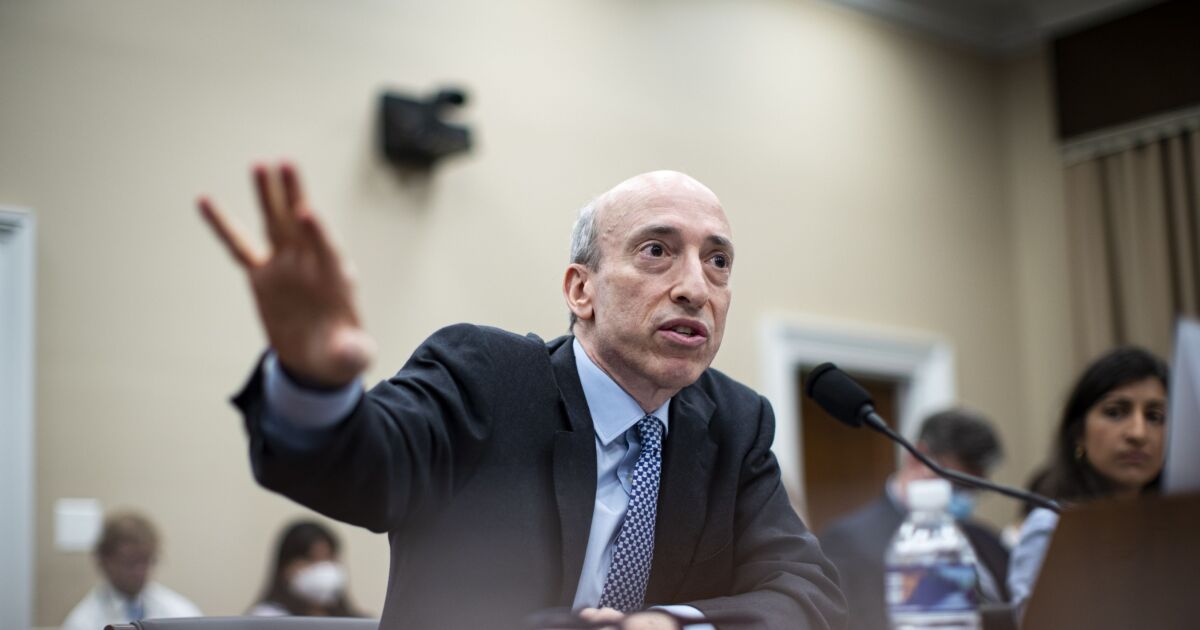The Securities and Exchange Commission adopted new rules and amendments Wednesday aimed at tightening the regulation of private fund advisors, especially at private equity and hedge funds, and updating the existing rule that applies to all investment advisors. The new rules would require them to disclose more information about their fees and require annual financial statement audits for each fund they advise to be distributed to investors.
Private fund advisors registered with the SEC would be required to provide investors with quarterly statements detailing information regarding private fund performance, fees, and expenses. They would also need to obtain an annual audit for each private fund they advise, along with a fairness opinion or valuation opinion in connection with an adviser-led secondary transaction.
The new rules would also prohibit all private fund advisors from engaging in certain activities and practices that are contrary to the public interest and the protection of investors unless they provide certain disclosures to investors, and in some cases, receive investor consent, according to a fact sheet from the SEC. The rules would also prohibit all investment advisors providing certain types of preferential treatment that have a material negative effect on other investors and prohibit other types of preferential treatment unless disclosed to current and prospective investors. All registered advisors, including those that don’t advise private funds, would now need to document in writing the annual review of their compliance policies and procedures.
The new rules have long been a subject of concern for the private equity and hedge fund industry, which have lobbied against them, and they’re likely to be challenged in court.
However, SEC chairman Gary Gensler has pushed hard for them. “Private funds and their advisers play an important role in nearly every sector of the capital markets,” Gensler said in a statement Wednesday. “By enhancing advisors’ transparency and integrity, we will help promote greater competition and thereby efficiency. Consistent with our mission and Congressional mandate, we advance today’s rules on behalf of all investors — big or small, institutional or retail, sophisticated or not.”
Al Drago/Bloomberg
The new rules could open up more business opportunities for accountants and auditors. “If passed as proposed, the Commission will require private funds to be audited annually, and those audit reports would certainly be distributed to investors,” said Ken Joseph, head of Americas compliance and regulatory consulting at Kroll, ahead of the final vote by the SEC on Wednesday.
“To be fair, many funds are audited, but not all,” he added. “This would be an additional level of investor protection as you would have an independent auditor looking over the finances of the funds and with additional transparency because of the availability of those audits to investors.”
‘Aircraft carrier’ of new rules
Joseph was previously a supervisor in the SEC’s Division of Enforcement’s specialized asset management unit and a senior officer in the Commission’s Office of Compliance Inspections and Examinations. Joseph sees much more rulemaking coming out from the SEC, besides the recently issued cybersecurity rule and the climate-related disclosure rule that’s expected to be finalized this fall. Many of the rules could affect accountants and he sees them as an “aircraft carrier” full of new regulations.
“Auditors are involved on both sides, not just public company auditing and assurance, but also on the private fund side, because those private funds have to comply with the custody rule and, in all cases, would involve a PCAOB-registered auditor,” he said. “Either way, you slice it, the Commission has been on a tear with regards to rule proposals and rules making. The Commission as part of its responsibility for capital formation and investor protection periodically engages in rulemaking to ensure that various practices and concerns are addressed. In my memory, the current flurry of rulemaking is really unprecedented since at least Dodd-Frank.”
Among those rules, recently passed was a marketing rule effective, the last compliance date was November 4, 2022, which imposed additional requirements and therefore additional burdens and costs on private fund advisors who are marketing their investments to investors. “
He noted that the Dodd-Frank Wall Street Reform and Consumer Protection Act of 2010, which was issued in the aftermath of the financial crisis mandated many new rules from the SEC. He is seeing a similar trend underway at the SEC now.
“This period rivals that period of rulemaking,” said Joseph. “On the private fund side, in particular, the rules that are proposed and recently enacted are game changers in the private fund industry, if adopted as proposed. On the private fund side, part of the vibrant capital markets, we have characterized it as an aircraft carrier of various rule proposals that, if enacted, would dramatically change the economics of private fund advisors.”
Another rule that was recently passed was a marketing rule that became effective on Nov. 4, 2022, which imposed additional requirements on private fund advisors who are marketing their investments. Other rules relating to proxy voting on private funds and disclosures on Form PF regarding their investments and activities have recently passed.
On the horizon are proposed rules relating to technology and artificial intelligence, custody of client assets, outsourcing of various services, documentation of annual reviews, fairness opinions by advisor-led secondary transactions such as resales, due diligence for service providers, beneficial ownership disclosures and more.
“These rules, if passed as proposed, will prohibit charging of certain fees to private funds or portfolio companies, prohibit the collection of accelerated fees such as monitoring fees, prohibit charging fees related to certain regulatory exempt obligations such as examinations and investigations, prohibit preferential terms in so-called ‘side letters’ that are provided to certain investors unless disclosed and would prohibit borrowing from the funds,” said Joseph.
He noted that some of the rules are slated to be considered in October, and the likely implementation date could range between roughly six months to a year.
Compliance costs are likely to increase for the private equity and hedge funds and their advisors and service providers, which is one reason why industry opposition is likely to intensify.
“If we fast forward and look two years down the road, assuming that all of these rules are passed on the private fund issuer side, you can imagine the increased costs, regulatory burdens and risk from both an examination and an enforcement standpoint, that registered investment advisors would be under,” said Joseph. “It’s not just the advisors that would be impacted. Relationships with service providers who help them would be subject to due diligence. The renegotiation of certain contract arrangements, including side letter arrangements with investors, will be impacted. The cost of reporting, for example, of cyber breach reporting, will be increased no doubt. As an overall matter, the cost of compliance will increase. The likely impact on investors is that fees may increase in order to make the economics of managing the fund worthwhile.”
Credit: Source link











